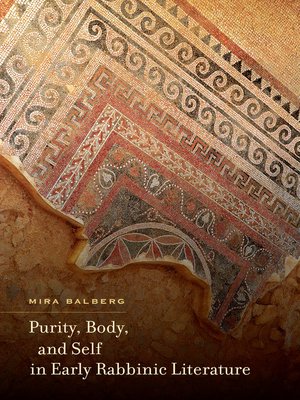
Sign up to save your library
With an OverDrive account, you can save your favorite libraries for at-a-glance information about availability. Find out more about OverDrive accounts.
Find this title in Libby, the library reading app by OverDrive.



Search for a digital library with this title
Title found at these libraries:
| Library Name | Distance |
|---|---|
| Loading... |
This book explores the ways in which the early rabbis reshaped biblical laws of ritual purity and impurity and argues that the rabbis' new purity discourse generated a unique notion of a bodily self. Focusing on the Mishnah, a Palestinian legal codex compiled around the turn of the third century CE, Mira Balberg shows how the rabbis constructed the processes of contracting, conveying, and managing ritual impurity as ways of negotiating the relations between one's self and one's body and, more broadly, the relations between one's self and one's human and nonhuman environments.
With their heightened emphasis on subjectivity, consciousness, and self-reflection, the rabbis reinvented biblically inherited language and practices in a way that resonated with central cultural concerns and intellectual commitments of the Greco-Roman Mediterranean world. Purity, Body, and Self in Early Rabbinic Literature adds a new dimension to the study of practices of self-making in antiquity by suggesting that not only philosophical exercises but also legal paradigms functioned as sites through which the self was shaped and improved.
With their heightened emphasis on subjectivity, consciousness, and self-reflection, the rabbis reinvented biblically inherited language and practices in a way that resonated with central cultural concerns and intellectual commitments of the Greco-Roman Mediterranean world. Purity, Body, and Self in Early Rabbinic Literature adds a new dimension to the study of practices of self-making in antiquity by suggesting that not only philosophical exercises but also legal paradigms functioned as sites through which the self was shaped and improved.







